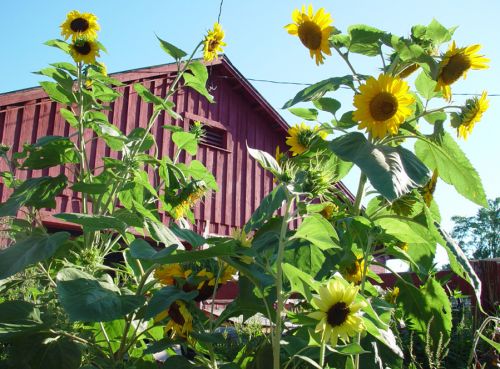Farm Sales
Overview
Although the high cost of farmland and an inability to qualify for a traditional bank mortgage loan is often a barrier to farm ownership for new farmers with limited capital or credit, there are a variety of government resources available to help farmers interested in purchasing farmland via a traditional sale. The USDA Farm Service Agency (FSA), for example, can provide access to loans for farmers and operations that meet specific requirements. See below and also visit the Federal Conservation Programs page for more information on government resources for farm buyers.
Before purchasing a new farm, however, farm buyers should carefully evaluate the land, farm buildings, soil, water, and accessible markets for the type of farming envisioned in order to ensure it will be possible to build a profitable operation. This page contains a list of tips for prospective farm buyers.
At the end of the day, if a traditional farm sale isn’t financially possible or appears too risky, farmers could consider a test period via a short-term lease or could look into one of the innovative models of land access discussed in this toolkit. For example, a traditional sale can be combined with other land access tools discussed in this toolkit, such as conservation easements, affirmative agricultural easements, options to purchase at agricultural value (OPAVs), collaborative farming arrangements, leasing, and partnerships with land trusts.
Farmer Spotlight:
Temple-Wilton Community Farm

The Temple-Wilton Community Farm has been operating a year-round CSA since 1986, making it the oldest continually-running CSA in the country.
 How A Traditional Farm Sale Works
How A Traditional Farm Sale Works
Traditional farm sales between a farm owner (seller) and a farm buyer are similar to residential real estate transactions. A traditional farm sale generally involves a buyer paying the seller a cash down payment (and potentially paying cash for closing costs) combined with bank financing in the form of a bank mortgage loan taken out by the buyer. Farm buyers may have difficulty accessing a bank mortgage loan because banks want to make sure that if they loan money to a new farmer, the new farmer will be able to make regular mortgage payments over time. The farm buyer must have a high enough credit score (combined with evidence of future income) to be able to qualify for a bank loan. This can be a barrier for new farmers, especially considering the high cost of farmland.
In a traditional sale, the farm seller (landowner) has immediate access to the money from the sale, but has no control over the farmland after the sale is complete. The farm buyer must immediately pay for the property (in the form of cash or a cash/loan combination) and in return obtains total control over the farm after the sale is complete.
Compare a traditional sale to other methods of farm transfer, like a contract for deed, with the toolkit’s farm transfer methods comparison chart. Additionally, legal tools like conservation easements can sometimes be used to lower the cost of purchasing farmland.
Government Resources For Farm Buyers
There are a variety of U.S. Department of Agriculture (USDA) programs that help support farmers interested in purchasing a new farm. These programs help provide farmers with access to farm-related loan money (either directly or indirectly through a network of private banks), and are often run through the USDA Farm Service Agency (FSA).
Farmers who meet specific requirements can get help accessing credit (loans) via the FSA Farm Loan Programs. According to the FSA Farm Loan Programs website, by providing access to credit, FSA helps family-sized farmers and ranchers:
- Start, improve, expand, transition, market, and strengthen family farming and ranching operations,
- Who are beginning farmers, racial and ethnic minority farmers, and women producers,
- With their value-added, direct sale, organic, and specialty crop operations,
- Who are young people actively involved in agricultural youth organizations needing financial assistance income-producing, educational, agricultural projects,
- Who are urban farmers and roof-top producers, and
- With operations using alternative farming methods such as hydroponics, aeroponics, vertical farming, and freight container farming.
In order to qualify for each different type of federal farm loan program, farmers must meet varying requirements regarding their planned use of the loan money. Additionally, some programs give priority consideration to farmers within certain groups, such as beginning, minority, and/or women farmers. For example, FSA makes and guarantees loans to beginning farmers who are not financially ready to obtain financing from commercial lenders. Each fiscal year, FSA targets a portion of its direct and guaranteed farm ownership and operating loan funds to beginning farmers. For an overview of FSA farm loan programs, click here, and learn more about federal farm programs here.
Note that applying to participate in a federal farm loan program requires significant farmer time spent on business planning, gathering information, and completing paperwork. It can be helpful to find out in advance what type of information mortgage lenders (banks) and government agencies (FSA) need from you in order to evaluate whether you can access a loan, and to start collecting that information as soon as possible.
See the Additional Resources section below for a list of resources related to government farm credit programs and land link programs.
Considerations For Farm Buyers
The following section contains a list of considerations that prospective farm buyers should keep in mind when thinking about purchasing a particular piece of farm property. Farms are unique with respect to soils, farm buildings, water access, prior use, easements, neighboring land use, access to markets (both for sale of farm products and job markets for off-farm employment), and fitness for the particular type of farming operation new farmers envision. It pays to do your homework before committing to purchasing a farm property.
Boundaries & Easements
- Ensure you walk the property and accurately identify property lines and any potential easements (or lack thereof). Do you have sufficient formal access to the property (e.g. an easement on your neighbor’s property allowing access to a roadway or a water source)? Without this type of access, you could end up purchasing land that you can’t actually use. On the flip side, note whether your neighbors own easements allowing them to use the new property for access to water, utilities, roadways, etc. A lawyer and/or the county assessor’s office can help you avoid surprises related to the property.
Proximity to Markets
- How close is the farm to your local markets and distribution channels? Often, your potential customers are in a city, so you’ll have to determine how far away you can be from your customers to make it worth the cost, energy, and time associated with the distribution of your farm products (either driving yourself or paying for transport). If you have a CSA or on-farm events, will your members or potential attendees be willing to make the drive out to your property? Additionally, since most farm families also generate income from off-farm jobs, consider how far you can be from potential off-farm employment options.
Zoning
- Is the farm zoned for farming, residential, or other use? If you’d like to diversify your farm operation by adding events, on-farm dinners, or a farm store, is that legally possible under current zoning? Notice what kind of operations your prospective neighbors are running, and check with your local county or municipality to find out what activities are allowed on the property. It is possible to petition for re-zoning or for a special exception (often called a “conditional use permit”), but getting the result you want from local government is far from guaranteed.
Taxes
- How much are the annual property taxes on the farm property per year? Is the property enrolled in a program that lowers property taxes for agricultural use (often called a “differential assessment” or “current use” program)? If so, find out what the requirements are for continuing with the program, and whether you can automatically remain in the program as a new owner. You can usually find information about property tax status from the county tax assessor, and you can learn more about differential assessment/current use programs here.
Soil & Terrain
- What is the condition of the soil? Is it immediately suitable for the type of farming you envision or has it been intensively used for a different type of commercial production and will it need soil remediation or intense weed control (perhaps for months or years)? Are parts of the property shady, sunny, rocky, dry, prone to flooding, scrub, marsh, forest, placed in a federal conservation program, part of a microclimate, or currently unproductive? You may want to visit the property more than once to assess the terrain, and it can be helpful to see if you can find out about the history of the land and prior land management practices. Information about farm soil can also be found via the USDA Natural Resources Conservation Service (NRCS) Web Soil Survey (covers 95 percent of the counties in the United States) or via independent soil testing.
Water
- Do you have access to enough water for your preferred type of operation? Vegetable production often requires more water than other types of production, for example. Do you have a well for the farmhouse or access to other safe drinking water? If you are in a dry area, or in an area where water rights are an issue (i.e., Western United States), will you also be able to purchase the water rights necessary for your operation to succeed? Is there infrastructure in place for irrigation and will irrigation be possible on the property? Does the land have a history of flooding, or is there drainage in place that is shared with neighbors or may be affected by a neighbor’s operation? Your state’s Department of Health or Department of Natural Resources may be a resource regarding water quality on the property, and you can also hire independent well drillers or conduct independent water testing.
Infrastructure
- What is the condition of the infrastructure on the property (barns, greenhouses, farmhouses, fences, outbuildings)? Are they suitable for your operation? Are the structures in good condition or will they require financial investment for repairs, alterations, or new construction? Purchasing property for a planned farm operation that is significantly different from the landowner’s current operation (moving from conventional to organic, for example, or from dairy to vegetables) will likely require at least some additional investment in infrastructure.
Equipment
- Are you purchasing equipment along with the property, and if so, is it the type of equipment you need? Is the equipment in good condition? What additional purchases will you need to make? Budget for these costs when considering the sale price.
Additional Considerations
- You may want to get to know more about your neighbors before purchasing farm property, and you might want to consult with a farm-focused real estate agent. Each farm and each farmer is unique, so consider your individual needs and the particulars of the property before committing to a certain farm property.
 How An Attorney Can Help
How An Attorney Can Help
The Attorney’s Role
It’s not an attorney’s job to make decisions for farmers or to set farm transfer goals. Instead, attorneys can provide information about pros and cons of different options, advice about what is common versus unusual, fair versus unfair, etc. Attorneys can help farmers understand the universe of possible farm transfer goals and help narrow down individual options so that farmers can make final decisions.
How An Attorney Can Help With Farm Sales
- Discover how the farm property is zoned, explain allowed land uses, and/or help petition local government bodies for re-zoning or a conditional use permit.
- Check the property’s tax status and advise about the requirements for a differential assessment or current use program.
- Find or access property lines, easements, water rights, or mineral rights.
- Draft, review or negotiate purchase agreement terms and language.
- Help you understand USDA farm loan program requirements and appeal any USDA decisions that are unfavorable to your farm (like denial of a loan, program eligibility, or insurance).
 Additional Resources
Additional Resources
Government Farm Loans
- USDA Farm Loan Programs Website (learn about available loans and download applications)
- USDA Farm Loans Overview Fact Sheet (April 2017)
- USDA New Farmers Access To Land And Capital (for beginning farmers)
- USDA Loans for Beginning Farmers Fact Sheet (March 2020)
- National Sustainable Agriculture Coalition Grassroots Guide To Federal Farm And Food Programs
- FLAG Farmers’ Guide To Minnesota Lending Law (includes detailed information about federal programs)
Land Link Resources
- Center for Rural Affairs, Linking Farmers With Land: Programs (list of national, regional and state land link programs)
- International Farm Transition Network
Farm Buyer Considerations
- Land Buying Checklist, Northwest Farm Credit Services
- Farm Rental Assessment Checklist, University of Vermont Extension (applies to farm purchases)
- How to Buy Farmland, Even If You Think You Can’t
- Top Ten Things I Learned Buying a Small Farm
- A Beginning Farmer’s Checklist For Buying A Small Farm
Related Legal Tools



The Center for Agriculture and Food Systems is an initiative of Vermont Law School, and this toolkit provides general legal information for educational purposes only. It is not meant to substitute, and should not be relied upon, for legal advice. Each farmer’s circumstances are unique, state laws vary, and the information contained herein is specific to the time of publication. Accordingly, for legal advice, please consult an attorney licensed in your state.


